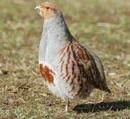Problems in the food chain
A Game Conservancy Trust study highlights a lack of food for declining birds


Arable crops contain a third less insects than are needed to sustain declining farmland birds such as grey partridges (above), yellowhammers and white throats. Ideally, birds need a mix of seed-bearing arable flowers, such as the field pansy or knotgrass, which will contain grasshoppers, caterpillars and leaf beetles.
However, a study, carried out by entomologists from The Game Conservancy Trust, shows that over the past five years insect populations have declined significantly. It highlighted the need for farmers to target control specifically at pernicious weeds, such as black grass, rather than non-competitive arable flowers that are favoured by birds and insects.
The study was carried out as part of the Defra-funded £3.5m project called Sustainable Arable Farming for an Improved Environment (SAFFIE), and was headed by Dr John Holland, who says: 'The decline of many farmland birds such as skylarks and grey partridges is linked to the loss of their food supply. Boosting the number of arable flowers in a crop encourages more insects and thus more farmland birds.'
The SAFFIE project aims to enhance farmland biodiversity by developing more wildlife-friendly farming techniques.
Exquisite houses, the beauty of Nature, and how to get the most from your life, straight to your inbox.
Country Life is unlike any other magazine: the only glossy weekly on the newsstand and the only magazine that has been guest-edited by His Majesty The King not once, but twice. It is a celebration of modern rural life and all its diverse joys and pleasures — that was first published in Queen Victoria's Diamond Jubilee year. Our eclectic mixture of witty and informative content — from the most up-to-date property news and commentary and a coveted glimpse inside some of the UK's best houses and gardens, to gardening, the arts and interior design, written by experts in their field — still cannot be found in print or online, anywhere else.
